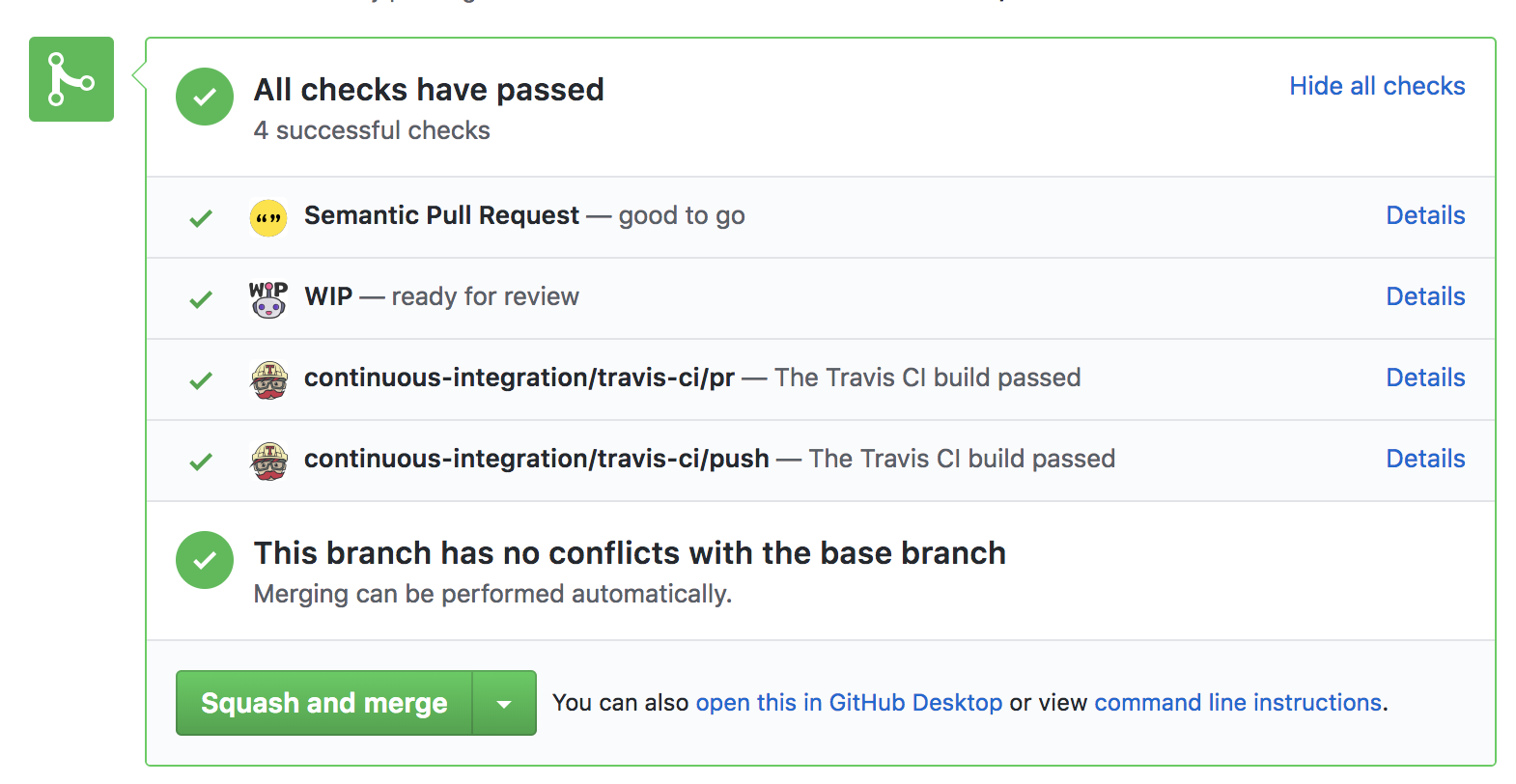https://github.com/zeke/semantic-pull-requests
:robot: Let the robots take care of the semantic versioning
https://github.com/zeke/semantic-pull-requests
Last synced: 10 months ago
JSON representation
:robot: Let the robots take care of the semantic versioning
- Host: GitHub
- URL: https://github.com/zeke/semantic-pull-requests
- Owner: zeke
- License: apache-2.0
- Created: 2018-02-26T22:38:57.000Z (about 8 years ago)
- Default Branch: main
- Last Pushed: 2022-05-30T08:16:45.000Z (almost 4 years ago)
- Last Synced: 2025-04-08T14:11:06.120Z (11 months ago)
- Language: JavaScript
- Homepage: https://github.com/apps/semantic-pull-requests
- Size: 1.77 MB
- Stars: 1,237
- Watchers: 15
- Forks: 124
- Open Issues: 0
-
Metadata Files:
- Readme: README.md
- License: LICENSE
- Code of conduct: CODE_OF_CONDUCT.md
Awesome Lists containing this project
- awesome-list - semantic-pull-requests
- stars - semantic-pull-requests
README
# ⚠️ THIS SERVICE IS NO LONGER MAINTAINED ⚠️
I maintained this project and kept the webservice running for several years, but it was often difficult, time-consuming, and generally low on my priority list compared to other things like work and family. The final blow was a [Heroku incident](https://status.heroku.com/incidents/2413) in April 2022 in which all of Heroku's GitHub-related secrets were compromised, and Heroku invalidated existing secrets and disabled support for all GitHub-related integrations.
If you're looking for an alternative way of semantically checking your PRs, see the [Alternatives](#alternatives) section in the README below. GitHub Actions are the way to go!
Thanks for your understanding. I wish you luck on your journey to semantic englightenment.
Love,
[@zeke](https://github.com/zeke)
---
---
---
---
---
# Semantic Pull Requests
> GitHub status check that ensures your pull requests follow the Conventional Commits spec
Using [semantic-release](https://github.com/semantic-release/semantic-release)
and [conventional commit messages](https://conventionalcommits.org)? Install this
[Probot](https://probot.github.io/) app
on your repos to ensure your pull requests are semantic before you merge them.
:hand: Wanna check your pull requests using a GitHub Actions workflow instead? See [alternatives](#alternatives) below.
## How it works
👮 Note! The default behavior of this bot is not to police all commit messages,
but rather to ensure that every PR has **just enough semantic information** to be
able to trigger a release when appropriate. The goal is to gather this semantic
information in a way that doesn't make life harder for project contributors,
especially newcomers who may not know how to amend their git commit history.
By default, only the PR title OR at least one
commit message needs to have semantic prefix. If you wish to change this
behavior, see [configuration](#configuration) section below.
Scenario | Status | Status Check Message
-------- | ------ | -------
PR title is [semantic][conventional commit type] | 💚 | `ready to be squashed`
any commit is semantic | 💚 | `ready to be merged or rebased`
nothing is semantic | 💛 | `add a semantic commit or PR title`
## Example Scenario
Take this PR for example. None of the commit messages are semantic, nor is the PR title, so the status remains yellow:


---
Edit the PR title by adding a semantic prefix like `fix: ` or `feat: ` or any other
[conventional commit type]. Now use `Squash and Merge` to squash the branch onto master and write a standardized commit message while doing so:
---


## Installation
👉 [github.com/apps/semantic-pull-requests](https://github.com/apps/semantic-pull-requests)
## Configuration
By default, no configuration is necessary.
If you wish to override some
behaviors, you can add a `semantic.yml` file to your `.github` directory with
the following optional settings:
```yml
# Disable validation, and skip status check creation
enabled: false
```
```yml
# Always validate the PR title, and ignore the commits
titleOnly: true
```
```yml
# Always validate all commits, and ignore the PR title
commitsOnly: true
```
```yml
# Always validate the PR title AND all the commits
titleAndCommits: true
```
```yml
# Require at least one commit to be valid
# this is only relevant when using commitsOnly: true or titleAndCommits: true,
# which validate all commits by default
anyCommit: true
```
```yml
# You can define a list of valid scopes
scopes:
- scope1
- scope2
...
```
```yml
# By default types specified in commitizen/conventional-commit-types is used.
# See: https://github.com/commitizen/conventional-commit-types/blob/v3.0.0/index.json
# You can override the valid types
types:
- feat
- fix
- docs
- style
- refactor
- perf
- test
- build
- ci
- chore
- revert
```
```yml
# Allow use of Merge commits (eg on github: "Merge branch 'master' into feature/ride-unicorns")
# this is only relevant when using commitsOnly: true (or titleAndCommits: true)
allowMergeCommits: true
```
```yml
# Allow use of Revert commits (eg on github: "Revert "feat: ride unicorns"")
# this is only relevant when using commitsOnly: true (or titleAndCommits: true)
allowRevertCommits: true
```
## Alternatives
This project is a GitHub App that you can install on one or many repositories, making it a convenient choice if you want to use it on lots of different repos, or even an entire GitHub organization full of repos. Now that this GitHub App is no longer available, [Semantic PRs](https://github.com/marketplace/semantic-prs) can be used as a drop-in replacement GitHub App.
If, however, you want more control over exactly how and when your pull requests are semantically checked, consider writing your own custom Actions workflow using a GitHub Action like [amannn/action-semantic-pull-request](https://github.com/amannn/action-semantic-pull-request).
See also https://github.com/squash-commit-app/squash-commit-app, a GitHub App which adds an empty commit to an open pull request with a single commit when the title was changed
## License
[Apache 2.0](LICENSE)
[conventional commit type]: https://github.com/commitizen/conventional-commit-types/blob/master/index.json